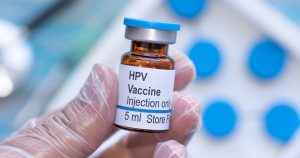Human papillomavirus (HPV) is one of the most common viral infections in the world. According to the Centers for Disease Control and Prevention (CDC), nearly 80% of people will contract HPV at some point in their lives.
While many HPV infections clear up naturally, some can persist and lead to six different types of cancer. Fortunately, there is a powerful tool to prevent HPV-related cancers: the HPV vaccine — the only vaccine specifically designed to prevent cancer.
By vaccinating children, adolescents, and adults up to age 45, families can dramatically reduce their risk of HPV-related cancers. Bayhealth Primary Care Physician John Fink, MD, shares critical insights into why the HPV vaccine is vital for long-term health.

Understanding HPV and Its Link to Cancer
What is HPV?
HPV is a group of more than 150 related viruses. Some types of HPV can cause warts, while others are responsible for different forms of cancer.
Most HPV infections are asymptomatic, meaning people can carry and spread the virus without ever knowing.
Types of Cancer Linked to HPV
Persistent HPV infections can lead to six types of cancer:
-
Cervical cancer
-
Penile cancer
-
Vulvar cancer
-
Vaginal cancer
-
Anal cancer
-
Oropharyngeal cancer (cancers of the back of the throat, including the base of the tongue and tonsils)
Among these, only cervical cancer has a recommended screening test—the Pap smear.
The other five types may go unnoticed until significant health issues arise.
When and Who Should Get the HPV Vaccine?
Recommended Ages for Vaccination
The CDC recommends starting the HPV vaccine at ages 11 to 12.
Key guidelines include:
-
Ages 9–14: Two-dose series.
-
Ages 15–26: Three-dose series.
-
Ages 27–45: Vaccination based on individual risk discussions with a healthcare provider.
The vaccine is most effective when given before exposure to the virus, making early vaccination critical.
Addressing Safety Concerns About the HPV Vaccine
Is the HPV Vaccine Safe?
Safety concerns have historically made some parents hesitant.
However, extensive research and real-world monitoring confirm that the HPV vaccine is:
-
Extremely safe
-
Well-tolerated
-
Highly effective
Mild side effects like soreness at the injection site, headache, or low-grade fever are normal and temporary.
Serious side effects are extremely rare.
Why Boys and Men Also Need the HPV Vaccine
Initially, the HPV vaccine focused mainly on protecting girls and women against cervical cancer.
However, experts now stress the importance of vaccinating boys as well.
HPV and Men: A Growing Concern
Head and neck cancers, especially oropharyngeal cancers, are rising among men.
By vaccinating boys early:
-
HPV transmission rates drop.
-
Cancer prevention improves for both genders.
Expanded Eligibility: Vaccination Up to Age 45
Originally, the vaccine was approved for ages 11–26, but now it’s available up to age 45.
Adults who missed vaccination during adolescence can still benefit.
Why Earlier Vaccination Is Better
Although vaccination later in life provides protection, studies show that:
-
The earlier the vaccine is administered, the more effective it is.
-
Immunizing before sexual activity begins yields the strongest immune response.
Even if someone is already sexually active, vaccination can still provide protection against HPV strains they haven’t yet encountered.
Key Takeaways for Families
-
Start conversations early about the HPV vaccine with healthcare providers.
-
Vaccinate children at ages 11–12 for optimal protection.
-
Don’t delay—even young adults can benefit from vaccination up to age 45.
-
Protect both girls and boys to prevent a wide range of cancers.
Vaccinating today means saving lives tomorrow.
FAQs
1. What types of cancer does HPV cause?
HPV can cause cervical, penile, vulvar, vaginal, anal, and oropharyngeal (throat) cancers.
2. At what age should children receive the HPV vaccine?
The CDC recommends vaccination starting at ages 11–12, though it can begin as early as age 9.
3. Is the HPV vaccine safe?
Yes. Extensive research and monitoring have shown the HPV vaccine is very safe with few side effects.
4. Should boys receive the HPV vaccine too?
Absolutely. Vaccinating boys helps prevent HPV-related cancers, particularly head and neck cancers, and reduces virus transmission.
5. Can adults still get vaccinated against HPV?
Yes, adults up to age 45 can be vaccinated, though earlier vaccination offers the most protection.




